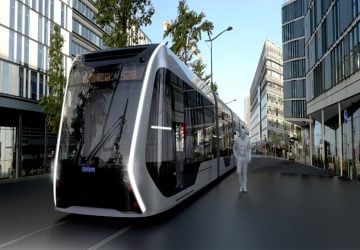In this guide, we explore how green mobility and efficiency innovation can create sustainable cities with effective rapid transit solutions.

Green Mobility
Green mobility focuses on using environmentally friendly transportation methods that reduce carbon emissions and promote sustainability. Here's how to incorporate green mobility into urban planning:
Creating bike lanes and dedicated paths encourages cycling, reducing reliance on motor vehicles. Cities like Copenhagen and Amsterdam have shown that well-planned bike infrastructure can significantly decrease pollution and traffic congestion.
Tips:- Develop a comprehensive network of bike lanes.- Provide ample, secure bike parking.- Implement bike-sharing programs for easy access.
Public transport, including buses, trams, and trains, should be efficient, accessible, and eco-friendly. Transitioning to electric buses and trams reduces emissions.
Tips:- Update routes to improve coverage and reduce transit times.- Ensure affordability and accessibility for all citizens.- Invest in fleet modernization, prioritizing low-emission vehicles.
Switching to EVs reduces reliance on fossil fuels. Promote the use of EVs through incentives and necessary charging infrastructure.
Tips:- Provide tax benefits or rebates for EV purchases.- Establish widespread and reliable charging stations.- Promote EV car-sharing programs to reduce overall vehicle numbers.
Efficiency Innovation
Efficiency innovation aims to create smarter, more sustainable urban mobility systems by leveraging technology and data. Here’s how cities can achieve this:
Use AI and IoT technologies to optimize traffic flow and reduce congestion. Smart traffic lights can adjust in real-time, improving fuel efficiency and reducing idling times.
Tips:- Implement adaptive traffic signal control systems.- Use traffic data analytics to anticipate and mitigate congestion.- Promote the integration of intelligent transport systems (ITS).
Real-time updates about public transport schedules and delays can significantly improve user experience, making public transport more reliable and efficient.
Tips:- Utilize mobile apps to provide real-time updates and route planning.- Integrate GPS tracking systems in all public transport vehicles.- Provide clear and real-time information at transit stops.
Dynamic routing adjusts transport routes in response to real-time demand, optimizing service efficiency and reducing wait times.
Tips:- Incorporate ride-sharing algorithms for public transport.- Encourage microtransit options with flexible routes.- Utilize data analytics to predict and respond to passenger demand.
Rapid Transit
Efficient and fast public transport is key to reducing traffic congestion and promoting sustainable urban development. Here are ways to enhance rapid transit:
Investing in and expanding rail networks, including subways and light rail, can drastically cut commuting times and increase transport reliability.
Tips:- Plan extensive and interconnected rail routes.- Prioritize urban and suburban expansions for maximum coverage.- Implement high-frequency schedules to reduce wait times.
BRT systems provide high-speed, high-capacity bus services through dedicated lanes, reducing congestion and travel time.
Tips:- Design exclusive bus lanes, affordable from regular traffic interference.- Ensure smooth and frequent operations with minimal stops.- Implement advanced ticketing systems to reduce boarding times.
TOD focuses on developing mixed-use residential and commercial areas around transit hubs, increasing public transport usage and decreasing car dependency.
Tips:- Develop high-density housing near transit stations.- Encourage commercial establishments and amenities in transit zones.- Ensure pedestrian-friendly infrastructure around transit hubs.
Combining green mobility, efficiency innovation, and rapid transit systems can lead to sustainable, efficient, and livable cities. Here’s how to integrate these strategies:
Engaging public sector agencies, private sectors, and communities in a collaborative approach ensures that initiatives are well-rounded and widely supported.
Tips:- Form public-private partnerships to fund and implement projects.- Foster community involvement through consultation and feedback mechanisms.- Promote transparency and regular updates on progress and benefits.
Public sectors should create policies and incentives that encourage sustainable practices and the use of green mobility options.
Tips:- Enact legislation mandating sustainable urban planning and development.- Offer subsidies or tax benefits for using environmentally friendly transport.- Implement congestion charges in urban areas to discourage car usage.
Regular evaluation and feedback mechanisms ensure that systems are optimized and adapt to changing needs and technologies.
Tips:- Set up monitoring systems to track progress and efficacy.- Conduct surveys and collect data on user satisfaction and areas for improvement.- Update plans and strategies regularly based on new insights and technological advancements.
In embracing green mobility, efficiency innovation, and rapid transit, cities can move towards a future that is sustainable, efficient, and equitable for all residents.
Explore the Tranquil Bliss of Idyllic Rural Retreats

Ultimate Countdown: The 20 Very Legendary Gaming Consoles Ever!

Understanding Halpin and its Influence

Affordable Full Mouth Dental Implants Near You

Discovering Springdale Estates

Illinois Dentatrust: Comprehensive Overview

Embark on Effortless Adventures: Unveiling the Top in Adventures Made Easy Outdoor Equipment

Unveiling Ossur Valves: Innovation in Prosthetics

Unlock the Full Potential of Your RAM 1500: Master the Art of Efficient Towing!
